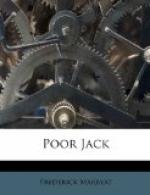We then left old Anderson to his duties, and my father went home with me. We had a long conversation relative to my sister, as well as about my own affairs. I had intended to have remained some days at Greenwich, but this was the first time that I had been there since Janet’s desertion, and the sight of everything so reminded me of her, and made everything so hateful to me, that I became very melancholy. My mother was, moreover, very cross, and my sister anything but comfortable; and, on the third day, having received a letter from Bramble, stating that he had arrived at Deal, and that the easterly winds having again set in, they talked, of setting out again in the galley, I made this an excuse for leaving; and for the first time did I quit Greenwich without regret.
CHAPTER FORTY-ONE
In which it is proved
that Sailors have very correct Ideas as to
Metempsychosis.
The day after my return to Deal I again embarked with Bramble and three others, to follow up our vocation. The second day we were abreast of the Ram Head, when the men in another pilot boat, which had come out of Plymouth and was close to us, waved their hats and kept away to speak to us. We hove-to for them.
“Have you heard the news?” cried one of the men.
“No.”
“Lord Nelson has beat the French and Spanish fleet.”
“Glad to hear it—huzza!”
“Lord Nelson’s killed.”
“Lord Nelson’s killed!” The intelligence was repeated from mouth to mouth, and then every voice was hushed; the other boat hauled her wind without further communication, nor did we at the time think of asking for any more. The shock which was given to the whole country was equally felt by those who were seeking their bread in a small boat, and for some little while we steered our course in silence.
“What d’ye say, my lads?” said Bramble, who first broke silence; “shall we haul up for Cawsand, and get a paper? I shan’t be content till I know the whole history.”
This was consented to unanimously; no one thought of piloting vessels for the moment and earning food for their families. When the country awarded a public funeral to our naval hero, it did not pay him a more sincere tribute than was done in this instance by five pilots in a galley. At Cawsand we obtained the newspaper, and after a few pots of beer we again made sail for the mouth of the Channel. It hardly need be observed that the account of this winding-up, as it proved, of our naval triumphs, with the death of Nelson, was the subject of conversation for more than one day. On the third we were all separated, having fallen in with many windbound vessels who required our services. The one I took charge of was a West Indiaman, deeply laden with rum and sugar, one of a convoy which were beating about in the Chops of the Channel. As we were standing out from the English coast the captain and one of the passengers were at the taffrail close to me.




